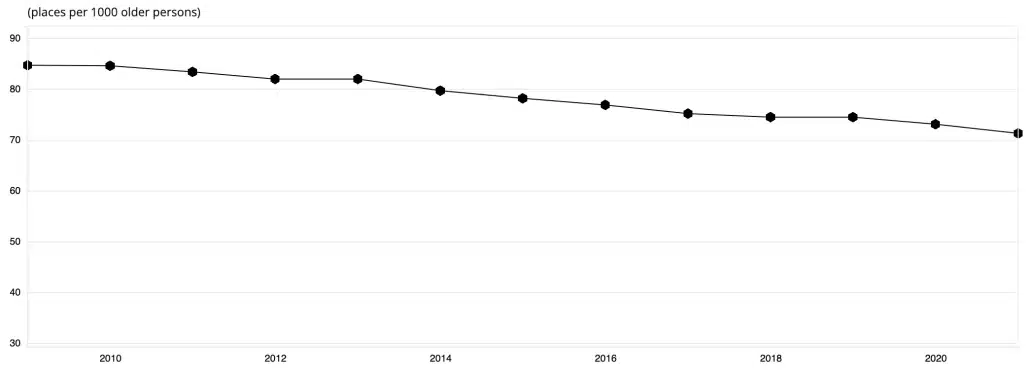Federal Budget 2023-2024: A Positive Outlook for Aged Care Clients
Table of Contents
ToggleThe recently announced Australian Federal Budget 2023-2024 brings encouraging news for clients accessing aged care services.
Despite the government’s need to secure an additional $11.3 billion over the next four years to fund a 15% increase in award wages for 250,000 aged care workers, clients will not face an increase in aged care fees.
While the budget hints at potential future adjustments to client contributions, the overall focus remains on ongoing aged care reform and implementing recommendations from the Royal Commission.
Pay Increases for Aged Care Workers
The government has committed to funding the 15% award wage increase determined by the Fair Work Commission.
Starting from 1 July 2023, registered nurses, enrolled nurses, assistants in nursing, personal care workers, head chefs and cooks, recreational activities officers, and home care workers will benefit from these increases. The wage hikes will be financed through government subsidies, including increased AN-ACC funding for residential care, a new $10.80 ‘hotelling’ supplement to cover wages of chefs, cooks, and related services, higher Home Care Package budgets, and additional grants for the Commonwealth Home Support Programme.
Monitoring mechanisms will be in place to ensure that care providers pass on the additional revenue to aged care workers.
Review of Funding Arrangements and Taskforce
With the introduction of a new Aged Care Act planned for 1 July 2024, decisions regarding changes to client contributions have been deferred.
A newly established Aged Care Taskforce will undertake a comprehensive review of funding arrangements, striving to propose fair and equitable options for all Australians. This review will consider the recommendations of the Royal Commission and prioritise sustainability in the aged care system, equity for older people in need of care, and innovation to enhance elements valued by Australians.
The government has commissioned an investigation into client contributions and awareness of relevant policies, the results of which are currently under review and may influence future decisions.

Reduced Residential Care Ratios
In a bid to generate savings of $2.2 billion, the government will temporarily decrease the ratio of subsidised residential care places from 78.0 per 1,000 people aged 70 and above to 60.1 places over a period of three years, beginning in 2024-2025. This reduction aligns with the trend of older people expressing a preference to remain at home.
From 1 July 2024, residential aged care places will be allocated directly to older people, enabling them to receive care from their chosen providers. This change aims to stimulate competition and foster development in the aged care services sector.

Source: Australian Government Productivity Commission
Expansion of Home Care Packages
The number of Home Care Packages will continue to rise, with an additional 9,500 packages becoming available in the 2023-2024 period.
By June 2024, the total number of Home Care Packages is projected to reach 285,100. This increase in packages has already led to a reduction in waiting times, with the average wait now ranging from 1 to 3 months. However, challenges persist due to capacity issues faced by providers as a result of workforce shortages.

Simplification of Home Care and Assessments
The integration of the Commonwealth Home Support Program (CHSP) and Home Care Packages (HCP) into a new Support at Home program has been postponed until 1 July 2025, allowing for further consultation and program design. Nevertheless, the implementation of a new single assessment system, set to replace the Regional Assessment Service (RAS) and Aged Care Assessment Teams (ACAT), is still on track for 1 July 2024.
A New Aged Care Act
The government is actively developing a new regulatory framework for aged care, which is expected to be implemented through a new Aged Care Act starting from 1 July 2024.
The upcoming reforms will prioritise improving the food, nutrition, and overall dining experience in residential care facilities. Additionally, residential care providers will be required to provide Monthly Care Statements to residents, outlining the care provided to them. The government aims to enhance the Star Ratings system, which is now publicly available on the MyAgedCare platform, providing transparency and guidance to individuals seeking aged care services. Furthermore, staffing quality indicators will be expanded to ensure higher standards of care.
The new Aged Care Act will adopt a person-centred and rights-based approach, placing emphasis on the well-being and rights of aged care recipients. It will outline the obligations of care providers and establish legislative requirements that safeguard older individuals’ right to receive safe and high-quality care.
With a clear statement of rights, the new Act aims to protect and empower aged care recipients throughout their care journey.

The Australian Federal Budget 2023-2024 presents a positive outlook for clients accessing aged care services. While avoiding fee increases for aged care clients, the budget reflects the government’s commitment to ongoing aged care reform.
Pay increases for aged care workers, the review of funding arrangements through the Aged Care Taskforce, and the allocation of residential aged care places directly to older people are all significant steps in ensuring a sustainable and improved aged care system. Moreover, the expansion of Home Care Packages and simplification of home care and assessments will contribute to better access and quality of care. The introduction of a new Aged Care Act underscores the government’s dedication to protecting the rights and well-being of aged care recipients.









